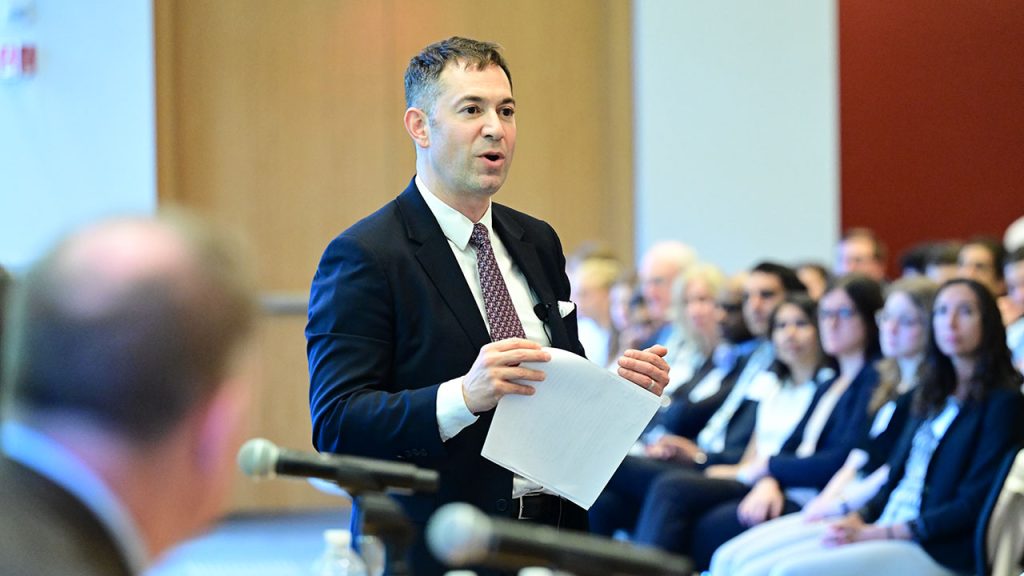Joseph Landau became the 12th dean of Fordham Law School on July 1. As a member of the law faculty since 2010 and associate dean of academic affairs since 2021, he has been lauded for his work on academic programming as well as his efforts to advance social justice through law, particularly in the movement for LGBTQ+ immigrants.
Landau will be formally installed in his new role in a ceremony on Sept. 12. Fordham Now sat down with him to discuss his vision for Fordham Law.
You taught at Fordham Law for many years and won the school’s Teacher of the Year Award twice. What did you enjoy about teaching, and how will it inform your role as dean?
Teaching has always been a highlight of my career. There’s something truly special about witnessing students tackle complex legal questions and watching them grasp new ideas. It’s a privilege to dive into the legal subjects I enjoyed most as a practicing attorney and see them come alive in new ways in the classroom. And Fordham students are amazing. They come to class prepared and ready to engage.
In your opening message to the Fordham community, you said that Fordham Law is well-positioned to address the “major challenges of our time,” including the polarization placing strains on our legal and political institutions. With a presidential election coming up, that polarization is likely to reach a fever pitch. How can Fordham Law address this challenge?
Fordham is committed to an environment in which students engage with diverse perspectives and develop the skills to counsel clients from all walks of life. Our graduates possess a unique ability to listen attentively, speak with clarity, and bridge divides. We are also unique for our community of trust—a place where people have respect for differing viewpoints and extend grace to those with whom they might disagree. When challenges arise, we get to lean into that communal fabric, and it makes a big difference.
You’ve spent your career working on behalf of marginalized communities, from recent immigrants to LGBTQ+ Americans. How will you continue this work as dean?
Fordham Law has a proud tradition of being a school of opportunity, opening doors for those who face barriers to a legal education. We are a place where students from diverse backgrounds come together, and we see ourselves as a positive force for change. This aspect of Fordham’s identity resonates very strongly with my work in social and legal movements, uniting people around common causes while driving change. I’m committed to continuing this work at Fordham, and I’m excited about it. We have always been—and will continue to be—a law school that promotes an education that brings out the best in everyone so that the broadest range of students can access the transformative power of legal education.
In an article you co-wrote with your predecessor, Dean Matthew Diller, you said that law schools must educate students about new technology emerging in the legal field, including virtual litigation tools, remote networking, and artificial intelligence. What steps should law schools be taking to ensure future lawyers use these technologies effectively and ethically?
The pace of technological change has been astounding, and not just in areas like AI. Law schools must stay ahead by equipping students not only to understand these tools but also to be leaders in shaping their future. Fordham Law School is positioning itself at the epicenter of law and technology. This means hosting conferences where the most important discussions on technology and the law take place, creating tech-focused competition teams, and fostering partnerships that expose students to real-world tech-driven legal problems. Our students engage with pressing issues such as AI and its intersection with ethics, bias, privacy, and both domestic and global regulation—preparing them for leadership in a rapidly evolving legal landscape.
You have said that Fordham Law operates “more fluidly across the theory-practice divide” than any other law school in the world. Can you explain what that means and why it makes you proud?
Some law schools focus heavily on abstract legal theory, while others train students solely for specific events like the bar exam. At Fordham, we excel at finding the ideal balance between those two approaches. Our students graduate with both a deep understanding of legal principles and the skills to apply them in real-world contexts—whether in private practice, government, or public service, and our alumni do some of the most important and sophisticated work across the legal field. This dual focus on both academic excellence and professional preparedness also defines our extracurricular offerings, competitions, and professionalism training. It’s what makes Fordham Law unique and why our alumni are so successful throughout the profession.

